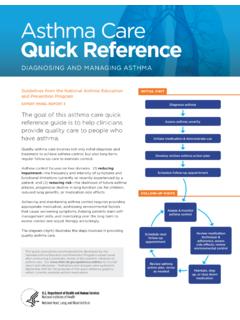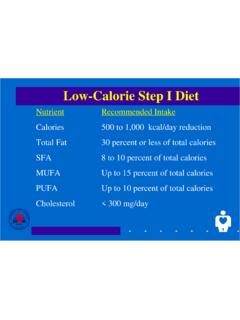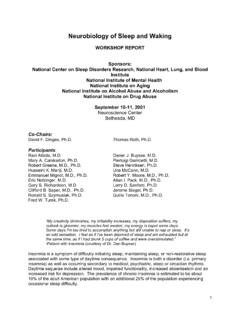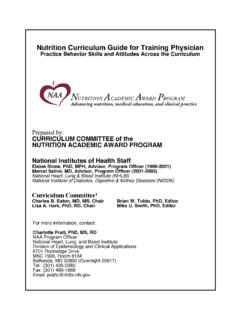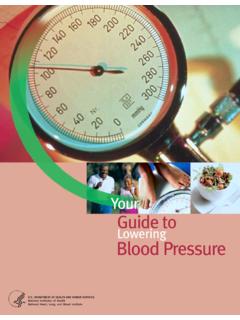Transcription of Goals of Weight Management/Treatment • Prevent further ...
1 Goals of Weight Management/Treatment Prevent further Weight gain (minimum goal). Reduce body Weight . Maintain a lower body Weight over long term. Target Weight : Realistic Goals Substitute healthier Weight for ideal or landmark Weight . Accept slow, incremental progress to goal. Short-term goal: 5 to 10 percent loss, 1 to 2 lb per week. Interim goal: Maintenance. Long-term goal: Additional Weight loss, if desired, and long-term Weight maintenance. Weight Loss Goals Goal: Decrease body Weight by 10 percent from baseline. If goal is achieved, further Weight loss can be attempted if indicated. Reasonable timeline: 6 months of therapy. Moderate caloric deficits Weight loss 1 to 2 lb/week Weight Loss Goals Start Weight maintenance efforts after 6 months. May need to be continued indefinitely. If unable to lose Weight , Prevent further Weight gain. Strategies for Weight Loss and Maintenance Dietary therapy Physical activity Behavior therapy Combined therapy Pharmacotherapy Weight loss surgery Weight Loss Therapy Whenever possible, Weight loss therapy should employ the combination of Low-calorie/low-fat diets Increased physical activity Behavior modification Goals of Weight Management/Treatment Prevent further Weight gain (minimum goal).
2 Reduce body Weight . Maintain a lower body Weight over long term. The general Goals of Weight loss and management are: At a minimum, to Prevent further Weight gain. To reduce body Weight if prescribed. To maintain a lower body Weight over the long term. Specific targets for each of these Goals can be considered. CORE SET III 1. Target Weight : Realistic Goals Substitute healthier Weight for ideal or landmark Weight . Accept slow, incremental progress to goal. Short-term goal: 5 to 10 percent loss, 1 to 2 lb per week. Interim goal: Maintenance. Long-term goal: Additional Weight loss, if desired, and long-term Weight maintenance. CORE SET III 2. Weight Loss Goals Goal: Decrease body Weight by 10 percent from baseline. If goal is achieved, further Weight loss can be attempted if indicated. Reasonable timeline: 6 months of therapy. Moderate caloric deficits Weight loss 1 to 2 lb/week The initial target goal of Weight loss therapy is to decrease body Weight by 10 percent.
3 Once this target is achieved, further Weight loss can be attempted if indicated. The rationale for this initial goal of moderate Weight loss, , 10 percent of initial body Weight , is that It can decrease the severity of obesity-associated risk factors. It can set the stage for further Weight loss, if indicated. It is realistic and can be achieved and maintained over time. A reasonable timeline for a 10 percent reduction in body Weight is 6 months of therapy. For overweight patients with BMIs in the typical range of 27 to 35, caloric deficits of 300 to 500 kcal/day will result in Weight losses of to 1 lb/week and a 10 percent Weight loss in 6 months. For more severely obese patients with BMIs > 35, deficits of up to 500 to 1,000 kcal/day will lead to Weight losses of 1 to 2 lb/week and a 10 percent Weight loss in 6 months. Theoretically, this caloric deficit should result in a loss of 26 to 52. pounds in a year. However, the average amount of Weight lost usually is in the range of 20 to 25 pounds.
4 CORE SET III 3. Weight Loss Goals Start Weight maintenance efforts after 6 months. May need to be continued indefinitely. If unable to lose Weight , Prevent further Weight gain. Once Weight loss Goals have been achieved, maintaining a lower body Weight becomes a major challenge. Weight maintenance efforts should begin after 6 months of Weight loss, since at this point it is difficult for most patients to continue to lose Weight owing to changes in resting metabolic rates and difficulty in adhering to treatment strategies. To achieve additional Weight loss, the patient must further decrease calories and/or increase physical activity since energy requirements decrease as Weight is decreased. For Weight maintenance, the combined modalities of therapy (dietary therapy, physical activity, and behavior therapy) must be continued indefinitely; otherwise, excess Weight likely will be regained. Observation, monitoring, and encouragement of patients who have successfully lost Weight should be continued on a long-term basis in order to help Prevent Weight regain.
5 CORE SET III 4. Strategies for Weight Loss and Maintenance Dietary therapy Physical activity Behavior therapy Combined therapy Pharmacotherapy Weight loss surgery In the guidelines, six strategies for Weight loss and maintenance are discussed: dietary therapy, physical activity, behavior therapy, combined therapy, pharmacotherapy, and Weight loss surgery. Each of these strategies will be featured in turn. CORE SET III 5. Weight Loss Therapy Whenever possible, Weight loss therapy should employ the combination of Low-calorie/low-fat diets Increased physical activity Behavior modification CORE SET III 6.

